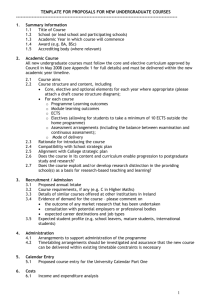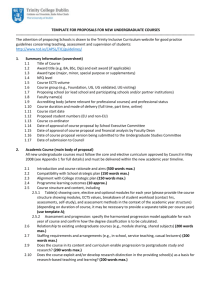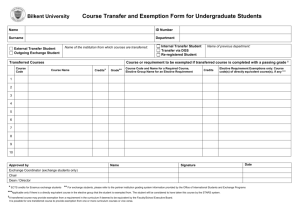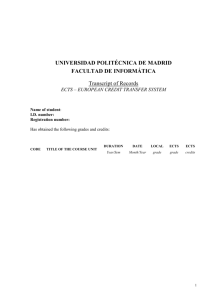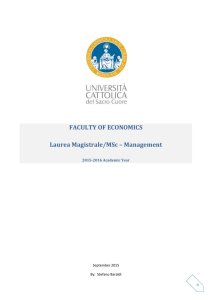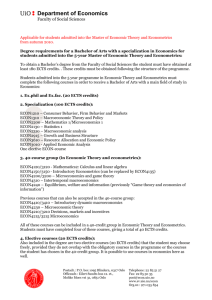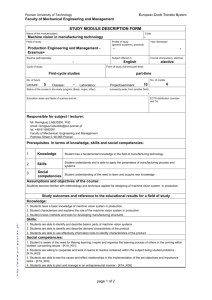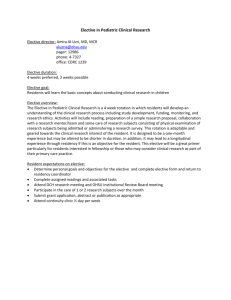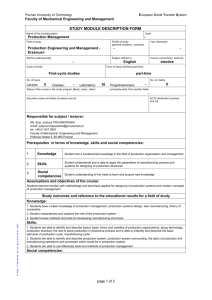template for proposals for new undergraduate courses
advertisement
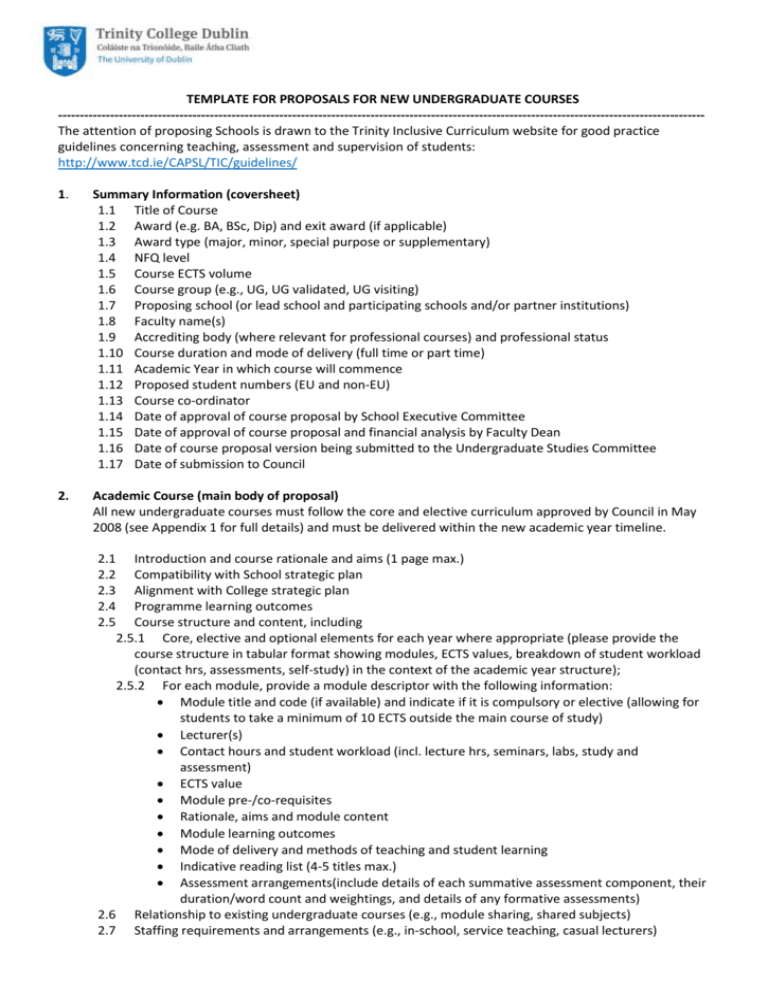
TEMPLATE FOR PROPOSALS FOR NEW UNDERGRADUATE COURSES ----------------------------------------------------------------------------------------------------------------------------------------------------The attention of proposing Schools is drawn to the Trinity Inclusive Curriculum website for good practice guidelines concerning teaching, assessment and supervision of students: http://www.tcd.ie/CAPSL/TIC/guidelines/ 1. Summary Information (coversheet) 1.1 Title of Course 1.2 Award (e.g. BA, BSc, Dip) and exit award (if applicable) 1.3 Award type (major, minor, special purpose or supplementary) 1.4 NFQ level 1.5 Course ECTS volume 1.6 Course group (e.g., UG, UG validated, UG visiting) 1.7 Proposing school (or lead school and participating schools and/or partner institutions) 1.8 Faculty name(s) 1.9 Accrediting body (where relevant for professional courses) and professional status 1.10 Course duration and mode of delivery (full time or part time) 1.11 Academic Year in which course will commence 1.12 Proposed student numbers (EU and non-EU) 1.13 Course co-ordinator 1.14 Date of approval of course proposal by School Executive Committee 1.15 Date of approval of course proposal and financial analysis by Faculty Dean 1.16 Date of course proposal version being submitted to the Undergraduate Studies Committee 1.17 Date of submission to Council 2. Academic Course (main body of proposal) All new undergraduate courses must follow the core and elective curriculum approved by Council in May 2008 (see Appendix 1 for full details) and must be delivered within the new academic year timeline. 2.1 2.2 2.3 2.4 2.5 Introduction and course rationale and aims (1 page max.) Compatibility with School strategic plan Alignment with College strategic plan Programme learning outcomes Course structure and content, including 2.5.1 Core, elective and optional elements for each year where appropriate (please provide the course structure in tabular format showing modules, ECTS values, breakdown of student workload (contact hrs, assessments, self-study) in the context of the academic year structure); 2.5.2 For each module, provide a module descriptor with the following information: Module title and code (if available) and indicate if it is compulsory or elective (allowing for students to take a minimum of 10 ECTS outside the main course of study) Lecturer(s) Contact hours and student workload (incl. lecture hrs, seminars, labs, study and assessment) ECTS value Module pre-/co-requisites Rationale, aims and module content Module learning outcomes Mode of delivery and methods of teaching and student learning Indicative reading list (4-5 titles max.) Assessment arrangements(include details of each summative assessment component, their duration/word count and weightings, and details of any formative assessments) 2.6 Relationship to existing undergraduate courses (e.g., module sharing, shared subjects) 2.7 Staffing requirements and arrangements (e.g., in-school, service teaching, casual lecturers) 2.8 2.9 Assessment and progression: specify the harmonisation model applicable for each year of course Does the course in its content and curriculum enable progression to postgraduate study and research? 2.10 Does the course exploit and/or develop research distinction in the providing school(s) as a basis for research-based teaching and learning? 3. Recruitment / Admission 3.1 Proposed annual intake (EU and non-EU quotas) 3.2 Course requirements, if any (e.g. C in Higher Maths) 3.3 Details of similar courses offered at other institutions in Ireland or the U.K. 3.4 Evidence of demand for the course – please comment on the outcome of any market research that has been undertaken consultation with potential employers or professional bodies expected career destinations and job types 3.5 Expected student profile (e.g. school leavers, mature students, international students) and entry mechanism (e.g., CAO, direct entry) 4. Administration, Library and Student Services 4.1 Arrangements to support the administration of the programme (if shared across more than one school, confirm where responsibility for course administration falls) 4.2 Timetabling arrangements should be investigated and assurance that the new course can be delivered within existing timetable constraints is necessary 4.3 Indicate any specific Library requirements (please discuss these with the Subject Librarian for your School ahead of submitting the proposal for USC) 4.4 Outline student services requirements in the contexts of projected numbers and expected student profile. 5. Quality Assurance 5.1 Name of school or course committee that will oversee course matters 5.2 External examiner arrangements (are any new external examiner positions required) 5.2 Plans for student evaluation at module and course level Appendices to course proposal, to include: A Mapping of module learning outcomes to programme learning outcomes B Calendar entry for the University Calendar Part 2 C Agreements from the relevant Heads of School in relation to shared modules and service teaching D Costs –Income and expenditure analysis prepared with the Faculty Financial Advisor 2 Appendix 1 In May 2008 Council approved the introduction of revised course structure with a core and elective curriculum (CL/07-08/115) as follows: 1. College should implement as soon as practicable the revised course structure which comprises a core curriculum and an elective curriculum. a. The core curriculum will normally comprise a maximum of 220 ECTS credits over a four year programme. This will include mandatory and optional courses within the student’s programme of study. b. The elective curriculum will normally comprise a minimum of 20 ECTS credits over a four year programme. Of this, at least 10 ECTS credits will comprise personal or professional skills development, and these may include for example placements, dissertations, and research skills. The elective curriculum will also provide the opportunity for students to take 10 credits1 outside the students’ main programme(s) of study. c. Any deviation from this core and elective curriculum will require Council approval. 1.2. Subject to timetabling constraints and module availability, all new undergraduate degree programmes should comply with the core and elective curriculum. 1 The 10 ECTS should be modules from non-cognate/non-complementary disciplines. 3
